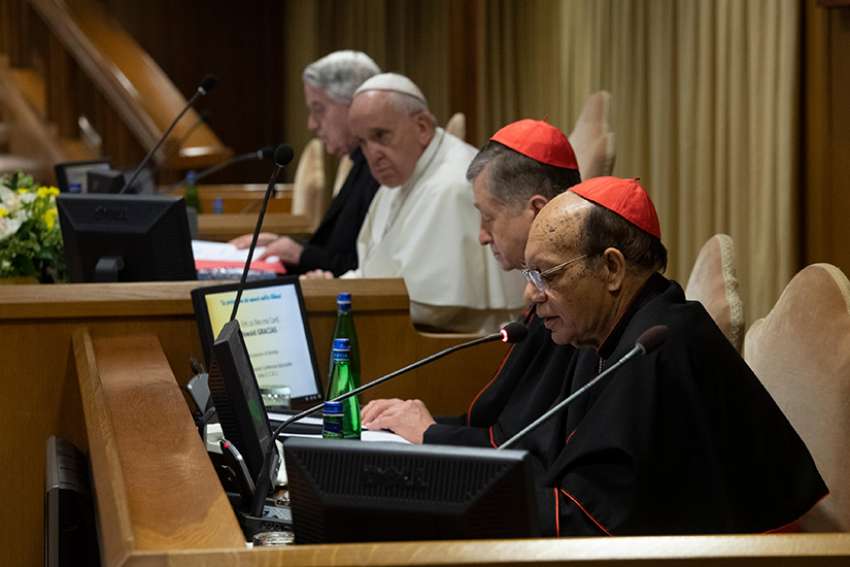Pope Francis, Cardinal Blase J. Cupich of Chicago and Cardinal Oswald Gracias of Mumbai, India, attend the second day of the meeting on the protection of minors in the church, at the Vatican Feb. 22, 2019.
CNS photo/Vatican Media
Cardinal Gracias asks clerics to cultivate 'culture of fraternal correction'
By Catholic News Service
VATICAN – Only together, by humbly sharing their experiences, encouragement and corrective advice, can the bishops and leaders in the Catholic Church work to prevent the abuse of minors and help bring healing to survivors, said the head of the Catholic Bishops' Conference of India.
Church leaders also must cooperate fully with local authorities because the sexual abuse of minors is also "criminal behavior," not just a violation of divine and church law, said Cardinal Oswald Gracias of Mumbai, India.
The cardinal, who also serves as a papal adviser in the Council of Cardinals, addressed Pope Francis and nearly 190 representatives of the world's bishops' conferences and religious orders Feb. 22 with a talk on accountability in a collegial and synodal church.
His 30-minute speech was punctuated with quotes from survivors he had met and the insights and impact that came from those encounters.
He said he was numb and speechless after a meeting with 12 victims two days ago. He said he could sense their "anger and bitterness, frustration, hurt and helplessness." However, he said, "We met just 12, but there would be tens of thousands more that we have not met. How do we respond to them? How do we help them? This is our challenge."
Cardinal Gracias said that by inviting presidents of national bishops' conferences and representatives of religious orders to the summit, the Pope has shown the way "the church must address this crisis" -- with a spirit and process of collegiality and synodality.
No bishop should ever believe he is facing the problem of abuse alone, and no bishop must ever say the problem of abuse in the church "does not concern me because things are different in my part of the world."
Not only is that not true, he said, it neglects the bishops' Christ-given mandate to be "solicitous for the whole church" and recognize they are "jointly responsible to tackle the problem of sexual abuse of minors by clerics all over the world."
Bishops must examine their actions, face the facts, acknowledge inadequacies, ask for forgiveness and commit to taking the steps needed to prevent future abuse, all while extending concern beyond one's local diocese to "all the churches with which we are in communion."
Cardinal Gracias said bishops must recognize how they have been responsible for the crisis by asking, "Do we really engage in an open conversation and point out honestly to our brother bishops or priests when we notice problematic behavior in them?"
"We should cultivate a culture of (fraternal correction), which enables this without offending each other, and at the same time recognize criticism from a brother as an opportunity to better fulfill our tasks," he said.
Sometimes this need for collegiality and listening to brother bishops has been ignored by those who believe "only the Pope can give us orders," he said.
Instead of a Rome-centered focus, the cardinal said, there should be more discussion between bishops' conferences and the Roman Curia to take into account and draw upon the diverse skills and competencies of "responsible shepherds" of the local churches.
He also asked whether further decentralization in dealing with abuse would "ensure speedier justice."
Cardinal Gracias underlined the importance of restoring civil justice when someone has been violated. After all, he said, "those who are guilty of criminal behavior are justly accountable to civil authority for that behavior."
"Although the church is not an agent of the state, the church recognizes the legitimate authority of civil law and the state," he said. "Therefore, the church fully cooperates with civil authorities in these matters to bring justice to survivors and to the civil order."
Throughout history, he said, the church often led the way in defending values, human rights, migrants, women, the family and the poor.
"Will the church become a model and be in the forefront in the protection of the rights of the child?" he asked.
"No easy or quick solution" will end the abuse crisis, he said. But "we are a pilgrim church learning from our mistakes, constantly trying to improve, to be faithful to the Gospel. We all make mistakes and need to learn from them."
"We must repent -- and do so together, collegially -- because along the way, we have failed. We need to seek pardon" and discern the next steps, the cardinal said.
"The path ahead is not mapped out with great detail and clear-cut precision," he said, and "we must be willing to pay the price of following God's will in uncertain and painful circumstances."
Tagged under:
Please support The Catholic Register
Unlike many media companies, The Catholic Register has never charged readers for access to the news and information on our website. We want to keep our award-winning journalism as widely available as possible. But we need your help.
For more than 125 years, The Register has been a trusted source of faith-based journalism. By making even a small donation you help ensure our future as an important voice in the Catholic Church. If you support the mission of Catholic journalism, please donate today. Thank you.
DONATE

